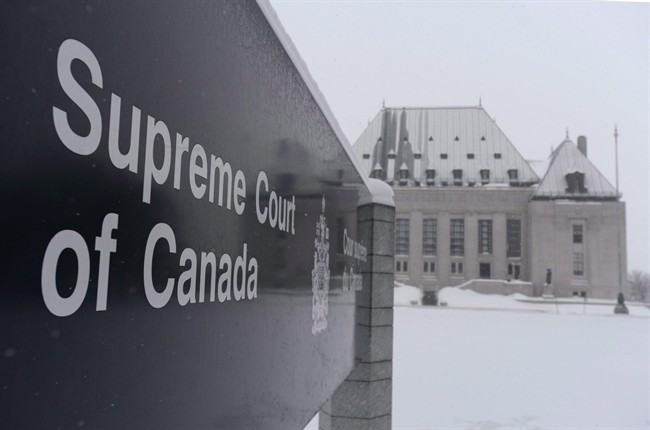OTTAWA – The Supreme Court of Canada is set to rule Friday on whether Alberta is required by the Constitution to enact its laws in both English and French.

The court will weigh in on the cases of two Alberta men charged with offences under the province’s Traffic Safety Act, which was passed only in English.
The legal arguments put forward by both sides are grounded in historical context.
The appellants have fought their cases on the grounds they have a constitutional right to legislative bilingualism — laws enacted in both languages.
Alberta motorist Pierre Boutet was given a traffic ticket in 2003 and argued it was unconstitutional because the law was not enacted in both languages.
READ MORE: Franco-Albertan wants to take language battle to Canada’s top court
Boutet’s case was later joined with that of Gilles Caron, which raised the same issues over another traffic offence.
After a 89-day trial in 2008, a provincial court ruled in favour of Boutet and Caron.
The judge found that the Royal Proclamation of 1869 and an 1870 order which made much of the Prairies part of Canada, placed an obligation on the Alberta legislature to enact legislation in English and in French.
In 2009, the Alberta government won on appeal.
READ MORE: $54 traffic ticket spurs prairies’ biggest language debate
A Court of Queen’s Bench judge said historical documents and orders did not enshrine language rights in Alberta — a judgment affirmed last year by the Alberta Court of Appeal.
Alberta’s top court said the province was not required to have bilingual laws.
“The fact that there is no constitutional document entrenching language rights in Alberta, whereas other constitutional documents clearly do so for other jurisdictions, is an insurmountable obstacle for the appellants,” the court said in its judgment.
“Must the statutes of the province of Alberta be printed and published in English and French? No.”
Caron’s lawyer, Roger Lepage, has argued the case also has implications for people in Saskatchewan, where language laws are similar to Alberta’s.
Lepage also said French speakers shouldn’t have to assimilate in Western Canada.
Caron, who grew up in Quebec but moved to Alberta for work, described feeling like an outsider after he arrived in the province.
“It felt like a shock, that this wasn’t Canada anymore,” Caron said last year. “By name it was Canada but … I was treated differently.”
In a 1988 decision, the Supreme Court of Canada found the power to legislate language belongs to both the federal and provincial levels of government, under their respective legislative authority.
The same year, Alberta moved to pass its Languages Act which states “all acts and regulations may be enacted, printed and published in English only.”
Similar traffic offence cases have been fought in other provinces.

Comments